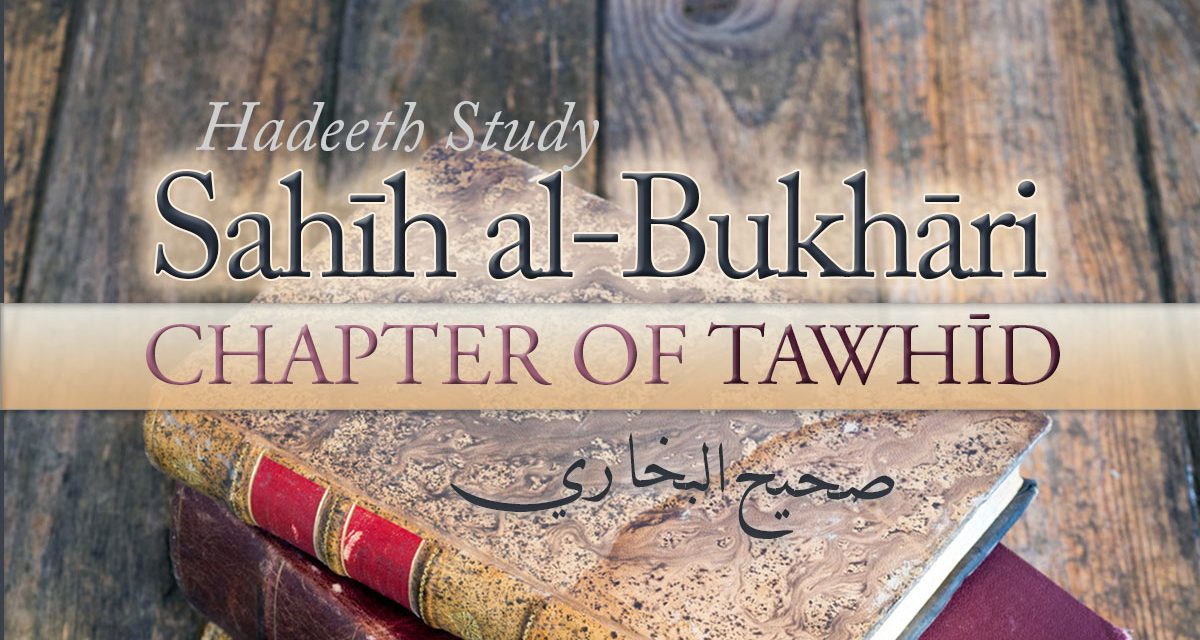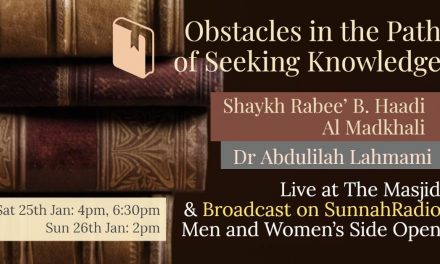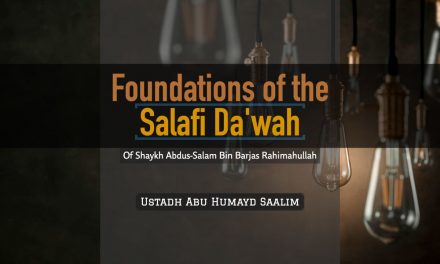The book of Tawheed from Sahih al-bukhari with the explanation of Shaykh ibn Uthaymeen
We will be using the explanation of Shaykh ibn Uthaymeen and the Explanation of Haafidh ibn Hajr (Fathul baari – Maktabah Islaamiyyah print)
(courtesy of Sahihalbukhari.com with permission from SalafiPublications – may Allah preserve them)
Lessons 1 to 56:
Lessons 57 to 96:
Notes
-
lesson 20
Hadith 4: I asked the Prophet, "I send off (for a game) my trained hunting dogs; (what is your verdict concerning the game they hunt?" He said, "If you send off your trained hunting dogs and mention the Name of Allah, then, if they catch some game, eat (thereof). And if you hit the game with a mi'rad (a hunting tool) and it wounds it, you can eat (it)." • The names of the narrators of the hadith [advanced] • The rulings revolving around keeping dogs • The conditions of prey that can be eaten • The three conditions of the trained dog • The legitimate rulings on slaughtering animals • What to do when a dog licks the vessel • Q&A o The stunning of animals o Gun shot of the animals o The meat of Ahlul Kitaab Benefit: To gain further understanding when we discuss the chains, follow our “Bayqooniyyah in the Sciences of Hadith” lessons on LearnAboutIslam: www.learnaboutislam.co.uk/2016/01/18/a…bayqooniyah/
-
Lesson 22
Chapter 13: Asking Allah by His Names and seeking refuge in Him by His names. Today we covered: Hadith 1: Narrated by Anas: The Prophet slaughtered two rams as sacrifice and mentioned Allah's Name and said, "Allahu-Akbar" while slaughtering). Recap of last lesson The names of the narrators of the hadith [advanced] The ruling of the slaughtering if a Muslim was involved alongside a Mushrik Narrated Jundab: That he witnessed the Prophet on the Day of Nahr. The Prophet offered prayer and then delivered a sermon saying, "Whoever slaughtered his sacrifice before offering prayer, should slaughter another animal in place of the first; and whoever has not yet slaughtered any, should slaughter a sacrifice and mention Allah's Name while doing so." Acts of worship have conditions Examples of conditions The definition of a condition Conditions cannot be excused from ignorance Saying Bismillah The meaning of Bismillah Why it is connected to slaughtering an animal The importance of saying it Narrated Ibn 'Umar: The Prophet said, "Do not swear by your fathers; and whoever wants to swear should swear by Allah." The names of the narrators of the hadith When taking an oath The impermissibility of swearing upon the creation The sin of swearing by other than Allaah The ruling of swearing upon the Qu’raan The importance of Kitaab at Tawheed Saying “I swear by the lord of the Kaa’bah” The ruling on Amulets Q&A Benefit: To gain further understanding when we discuss the chains, follow our “Bayqooniyyah in the Sciences of Hadith” lessons on LearnAboutIslam: http://www.learnaboutislam.co.uk/2016/01/18/al-mandhomah-al-bayqooniyah/
-
Lesson 24
Today’s lesson was largely a recap of last week’s lesson. It included a discussion of: The 4 prohibitions as it relates to the Names and Attributes of Allaah Azza Wa Jal, they are: “Ta’teel” – To reject the Names and Attributes “Tahreef” – To distort the meanings of the Names and Attributes “Takyeef” – To give descriptions to the Names and Attributes “Tamtheel” – To liken the Names and Attributes to creation This is as is mentioned in the beginning of Shaykh Al Islaam Ibn Taymiyyah’s treatise – “Al Aqeedatul Waasitiyyah”. For further details on these issues refer back to last week’s lesson. In addition, Ustadh Abu Muadh gave us some principles to be used when dealing with the People of Innovation, for example: It is not upon you to give proof for the default meaning of a name or attribute. (The Hand of Allaah is the Hand of Allaah, you do not need to give proof for this meaning as it is the origin!) Ask them for any of the salaf who understood the Names and Attributes in the way they are trying to explain them. He rounded up the lecture by reminding the brothers and sisters about the virtues of the first 10 days of Dhul Hijjah as well as some rulings related to it. Benefit: To gain further understanding when we discuss the chains, follow our “Bayqooniyyah in the Sciences of Hadith” lessons on LearnAboutIslam: http://www.learnaboutislam.co.uk/2016/01/18/al-mandhomah-al-bayqooniyah/
-
Lesson 26
Today’s lesson began with a new chapter: Chapter of the saying of Allaah: “And Allah warns you against Himself (His Punishment)” (Aale Imran V28) and His statement” “You know what is in my inner-self though I do not know what is in Yours”(Al Maa’idah V116). Benefits of the lesson include: This chapter was placed following the previous chapter related to the “Dhaat” (Essence) of Allaah to show that the “Nafs” and the “Dhaat” are the same. This shows the great level of understanding of Imam Al Bukhari. The differing levels of shirk (Major & Minor) and sin (Major & Minor) and their rulings. Some scholars mention that sins are a form of shirk. To find out the evidence for why they hold this, listen to next weeks lesson as this was assigned as Homework! Hadith 1 (in this chapter): Narrated Abdullah (Ibn Mas’ood): “The Prophet said, "There is none having a greater sense of Ghira than Allah, and for that reason He has forbidden shameful deeds and sins (illegal sexual intercourse etc.) And there is none who likes to be praised more than Allah does." Benefits from this hadith: The establishment of “Ghayra” (roughly translates to jealousy) for Allaah. From the effects of Ghayra, is anger. This hadith shows us the grave consequence of falling into Fawaahish (Shameful deeds and sins). Allaah loves Praise for Him as He is Most befitting of praise. Benefit: To gain further understanding when we discuss the chains, follow our “Bayqooniyyah in the Sciences of Hadith” lessons on LearnAboutIslam: http://www.learnaboutislam.co.uk/2016/01/18/al-mandhomah-al-bayqooniyah/







